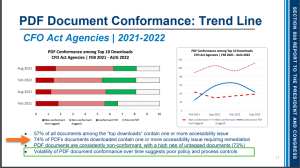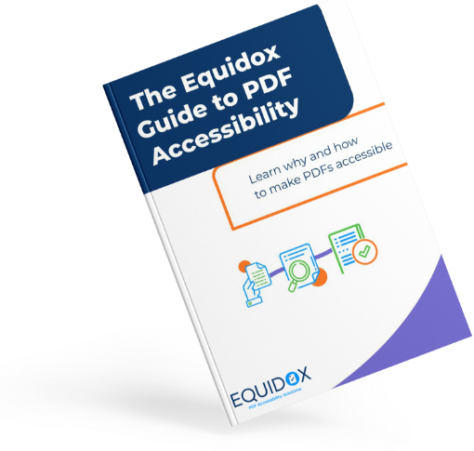
The U.S. Department of Justice (DOJ) recently released its Section 508 Report to the President for the year 2023. This report on accessibility highlights the government’s progress in implementing standards and policies to ensure equal access to information and technology for people with disabilities. It measures website accessibility, PDF document accessibility, and staff allocation and preparedness for 508 compliance. This report is the first in a decade, despite the report being mandated to be published every 2 years.
What is Section 508?
Section 508 is a provision of the Rehabilitation Act of 1973, which requires federal agencies to make electronic and information technology (EIT) accessible to individuals with disabilities. This includes websites, software, mobile applications, and other digital resources. The applicable standards are developed by the Access Board and enforced by the DoJ.
Some progress toward accessibility
The DOJ’s report, based on data collected by the General Services Administration (GSA) indicates that federal agencies have made significant progress in implementing Section 508 standards over the past year. For example, agencies have improved the accessibility of their websites and electronic documents, and have enhanced the accessibility of digital resources.
The DOJ’s report also notes that federal agencies have made strides in improving the accessibility of their physical facilities. Many agencies have implemented technology to make their buildings and offices more accessible, such as audio induction loops for individuals with hearing impairments.
Room for improvement
While the DOJ’s report highlights significant progress in implementing accessibility standards, it also acknowledges that there is still much work to be done. The report identifies several areas where improvements are needed, including:
PDF Documents
The report states that 74% of PDF documents are either untagged or incorrectly tagged (the report refers to them as “nonconformant”), meaning they are not accessible for users with disabilities. It is notable that 77% of the top document downloads on federal websites are PDFs.

Training
The report suggests that federal agencies should provide more training to their employees on accessibility standards and best practices.
Testing
Federal agencies need to perform more rigorous testing to ensure that their digital resources are accessible to individuals with disabilities.
Collaboration
Federal agencies need to collaborate more closely with disability advocacy groups and other stakeholders to identify and address accessibility challenges.
Compliance through transparency and accountability
The report suggests that federal agencies need to improve their compliance with Section 508 standards, by providing more transparency and accountability in their accessibility efforts. The accessibility of PDF documents fell largely into the “nonconformant” category.
The key to 508 compliance is continuous improvement
While the DOJ’s Section 508 Report to the President for 2023 highlights progress that federal agencies have made in implementing accessibility standards and policies, progress is still needed. The report also underscores the need for continued efforts to improve accessibility in all areas of government and to ensure equal access to information and technology for individuals with disabilities.
How conformant are your PDF documents? Contact us to learn how to automate the PDF remediation process and get compliant quickly and easily.
Tammy Albee
Tammy Albee | Director of Marketing | Equidox Tammy joined Equidox after four years of experience working at the National Federation of the Blind. She firmly maintains that accessibility is about reaching everyone, regardless of ability, and boosting your market share in the process. "Nobody should be barred from accessing information. It's what drives our modern society."

Learn more about PDF Accessibility!
Get our free Guide to PDF Accessibility and learn everything you need to know for successful PDF remediation. Our guide includes facts about PDF accessibility, instructions and workflows, and tips for evaluating PDF remediation tools and services.